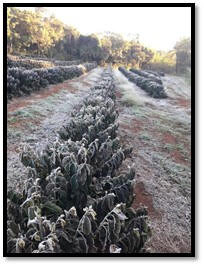Is my coffee getting more expensive?
Brazil supplies around 30% of the entire worlds coffee production. The vast majority of the coffee Brazil produces is arabica [the good stuff], and Commonfolk has a longterm partnership with our own Brazilian producer, Cafe Labareda aka Bom Jesus. In fact it’s probably our most requested origin - you folks just can’t seem to get enough of it!
Unfortunately Brazil’s main coffee growing regions have been hit by severe frosts. There are fears that this may have an incalculable impact on the Brazilian harvest. Coffee is an extremely sensitive plant that requires very a specific environment to thrive and survive. Frost doesn’t just destroy the prospect of a good harvest, it can actually kill the coffee shrub completely.
Early estimates fear that over 180,000 tons of coffee and billions of dollars have been lost to the frost.
Our partners at Cafe Labareda were hit very hard. In total, they have lost more than 120 hectares of mature coffee shrubs. The impact of this loss is profound, and will have flow on consequences for many years to come. As more information comes to light we will continue to provide you with updates, but you can see the devastating impact on their farm from the images they have sent us below.
Because Brazil is a major player in the coffee world, the impact of these events is sending reverberations through the entire supply chain. The majority of arabica coffee is traded as a commodity on the New York Stock Exchange on, what is colloquially know as, the C-Market. The ‘C-Price’ has sky rocketed as a result. Futures traders are scrambling to get their hands on a diminishing resource.
The market will close this week at nearly a 7 year high, sitting around the US$200c/lb range [nearly equal to the FairTrade price]. So while Brazil is suffering, many other coffee producing countries are directly benefiting from this spike in the price of coffee. It’s a basic supply vs demand scenario.
A snapshot of the C-Price over the past 12 months [source]
So what’s going to happen to your coffee?
Good question, and to be completely honest it’s a little more complex then it appears. Commonfolk doesn’t buy coffee off the commodities market. We practice a purchasing model that focuses on direct and longterm partnerships with our producers and farmers. This model allows us to pay a fairer price to the farmer, and share some of their risk, but it also removes any uncertainty about pricing because we pre-commit, often before the first coffee is even picked. It also means that we still have a steady supply of coffee that we have pre-contracted from our producing partners. Even Cafe Labareda have confirmed that our shipments won’t be impacted by the frost event.
It is unlikely that Commonfolk will have to raise the price of our coffee in the immediate future, but nearly inevitable that the price will increase at some point.
Our commitment to our producers means that to continue to support them we will have to pay them more. We’ve long felt that the majority of coffee sold is too cheap [but that’s another blog for another day] so a fair and measured price increase will be welcome news for many of our partners. For others, it will be the bare minimum to ensure they remain viable in and already challenging industry.
As the impacts of climate change continue to throw up extreme climatic events, such as the one we’ve witnessed in Brazil, the price of coffee will continue to be put under upwards pressure. Our encouragement to our coffee loving customers is to dig deep and spend the extra dollars required to drink ethically sourced partnership coffee. We’d also like to strongly encourage anyone with any questions to get in touch. Knowledge is power, and in the case of the specialty coffee industry, knowledge is the best way to ensure you know which coffees you should invest your hard earned pennies into.
Hit me up at sam.keck@commonfolkcoffee.com.au if you’d like to know more.







![A snapshot of the C-Price over the past 12 months [source]](https://images.squarespace-cdn.com/content/v1/559c880be4b01baae9b5cbd0/1627619984139-2JKRLDFQRP60ZYAI8020/Screen+Shot+2021-07-30+at+2.39.34+pm.png)